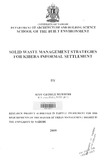| dc.description.abstract | In view of the fact that solid waste management in Kibera is a big challenge and that
there is no legal or institutional framework to address it, this study sought to identify
intervention points at which the situation can be remedied. This was done vide an
evaluation of the role of the youth groups in undertaking the solid waste management.
Further, the study assumed that the national urbanisation rate shall continue to rise and
Nairobi city shall continue to bare the burden of absorbing this population in higher
proportions relative to other towns in the country. Kibera neighbourhood is therefore
bound to continue experiencing an influx of immigrants consequently leading to the
neighbourhood’s population expansion and rise in the solid waste levels. The study also
assumed that there are no envisaged solid waste management interventions being
preferred on the settlement in the planning horizon spanning 20 years and that solid waste
management capacity of the City Council of Nairobi is at the lowest ebb and needs
augmentation from the communities concerned; in this case, the organised groups such as
the youth groups are vital in playing a leading role.
To meet the research objectives, a sample was obtained from the members of the
households, business operators, the youth groups through systematic random sampling.
Others respondents included the City Council of Nairobi’s Cleansing Section, the Social
Development Officer (SDO), key informants and local leaders. Primary data was mainly
obtained through interviews with the residents, key informants such as the Social
Development Officer, local chiefs and other leaders. Questionnaires were administered
on household residents, business operators, Cleansing Section of the Environment
Department of CCN and youth groups.
The study established that the legal and institutional framework as it is today does not
serve Kibera well. There is evidence of utter laxity by the institutions charged with the
responsibility of ensuring effective solid waste management in the city. It was also
established that the youth groups are the dominant organized groups engaged in solid
waste management in Kibera. Among the serious problems encountered in the solid
waste management efforts are poor roads, lack of appropriate equipment, low income,
ignorance, indiscriminate dumping and lack of sufficient community support among
others.
Success in establishing a sustainable solid waste management in Kibera lies in promotion
of a homegrown system that is seen to benefit the residents. The youth groups answer to
this description in that their efforts albeit dismal are already being appreciated by the
residents. After all they are part of the community. A broad-based coordinating
Committee comprising of stakeholders to moderate the interactions between all players
including government, NGOs/CBOs, the youth groups and the community at large needs
to be created and given mandate to act as the missing link that is causing suspicion
among the residents. | en |

